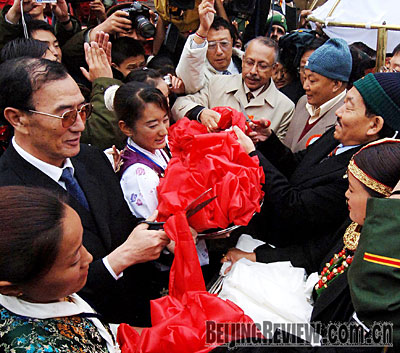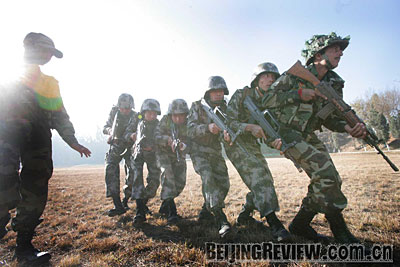|
What are the problem areas and how are things moving forward on those?
There are still some outstanding issues left by history between the two sides. China is of the view that these issues should be addressed in the spirit of peace, friendship, equality and consultation. It is necessary to proceed from the fundamental interests of the two countries and their peoples and find a fair and equitable solution acceptable to both. It is fair to say that positive progress has been made in negotiations on the related issues. The two sides need to continue to push for the growth of their bilateral relations, enhance mutual political trust and create a sound atmosphere and favorable conditions for the final settlement of those issues.

TRADE REVIVAL: Chinese and Indian officials and businesspeople celebrate the reopening of border trade at Nathu La, Tibet Autonomous Region, on July 6, 2006 (XINHUA)
Trade collaboration through border posts like Nathu La has not progressed much. What are the problems?
China and India opened border trade through Nathu La in July 2006. The total trade volume at the Nathu La border trade market was only about 4 million yuan ($570,000) in 2007. There is huge untapped potential. China adopts a positive attitude toward the development of China-India border trade. It hopes that India will further relax and eventually eliminate restrictions on commodities for border trade to help fully mobilize the enthusiasm of businesses on both sides, promote sound and smooth development of border trade and benefit the people living in border areas.
What are China's views on India's continued support to the Dalai Lama? Have you noticed any changes on this front in recent years?
The government of India recognizes that Tibet Autonomous Region is part of the territory of the People's Republic of China. It also promises not to allow anti-China political activities on Indian territory. This year, India adopted measures to ensure the safety of the Olympic torch relay in New Delhi and checked anti-China activities by activists for "Tibet independence" on more than one occasion. China appreciates this. We hope India will continue to abide by its commitments on Tibet-related issues.
Indian security officials often make allegations of Chinese incursions into Indian territory. What is the Chinese view?
The China-India boundary has never been formally delimited. China holds that the two countries should resolve the boundary question through negotiations in the spirit of peace, friendship, consultation on an equal footing, mutual respect and mutual accommodation. Pending an ultimate solution, China stands ready to work with India to maintain peace and tranquility in the border areas. The two countries signed the Agreement on the Maintenance of Peace and Tranquility Along the Line of Actual Control in the China-India Border Areas in 1993 and the Agreement on Confidence Building Measures in the Military Field Along the Line of Actual Control in the China-India Border Areas in 1996. China is serious about these two agreements.
Is this century indeed the India-China century? Where do you foresee the relationship between the two giants going over the next few decades and how will it impact the world?
The rapid development of China and India has brought new opportunities for bilateral relations and significant changes in Asia and beyond. Good neighborliness, friendship and joint development between China and India have become an irreversible trend, bringing benefits to 2.4 billion people in the two countries and making a significant impact on peace and development in Asia and the whole world. China stands ready to work with India to continue to enrich the China-India strategic partnership of cooperation and contribute our share to a harmonious Asia and a harmonious world with lasting peace and common prosperity.

JOINT MISSION: Chinese and Indian soldiers drill under the guidance of an Indian team leader during a joint antiterrorist training exercise in Kunming, Yunnan Province, on December 23, 2007 (LI GANG)
What concerns, if any, does China have about India's nuclear deal with the United States?
Both China and India are major developing countries experiencing rapid economic development. The two countries need secure, reliable and clean energy. Therefore, China understands India's need for civil nuclear energy and related international cooperation.
China believes all countries have the right to peaceful use of nuclear energy and the right to conduct related international negotiations based on the precondition of honoring international nuclear non-proliferation obligations. At the same time, cooperation of this kind should uphold the integrity and effectiveness of the international nuclear non-proliferation regime. | 